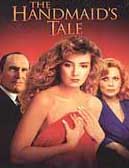FILM NOTES
FILM NOTES INDEX
NYS WRITERS INSTITUTE
HOME PAGE

(United States, 1990, 109 minutes, color, 35mm)
Directed by Volker Schlöndorff
Based on the novel by Margaret Atwood
Screen adaption by playwright Harold Pinter, 2005 winner of the Nobel Prize for Literature
Starring:
Natasha Richardson……….Kate
Faye Dunaway……….Serena Joy
Aidan……….Nick
Elizabeth McGovern……….Moira
Robert Duvall..........Commander
The
following film notes were prepared for the New York State Writers
Institute by Kevin Jack Hagopian, Senior Lecturer in Media Studies
at Pennsylvania State University:
In the nether-future America of The Handmaid's Tale, pollution, toxic waste, and disease has crippled the land, and religious tyranny has maimed the society. "Family values" have run amok. Child-rearing in America, now renamed the Republic of Gilead, has come to stand not just for the physical survival of the society, but for the embrace of a deranged right-wing ideology. The Republic of Gilead has become a breeder state. Kate (Natasha Richardson) tries to escape, and is punished by being made a Handmaid. It is to be her gendered lot in life to manufacture the babies who will guarantee the future of Gilead. And it becomes her purpose as a human being to escape this fate.
The politically courageous critique of "family values" in The Handmaid's Tale frightened off several actresses who were considered for the leading role of Kate; so did the dry, affectless performance style the role demanded. But Natasha Richardson, who had previously played the inscrutable Patty Hearst in Paul Schrader's 1988 film about the heiress/hostage/terrorist, was drawn to the role of Kate, and to director Volker Schlöndorff's anti-melodramatic way of depicting the forces at war in Harold Pinter's screenplay of Margaret Atwood's novel. Schlöndorff renders Gilead in frozen tones, its citizens as often struck dumb by banality as horror. Indeed, the film was criticized for whispering its message instead of shouting it; some felt that a female director would have given The Handmaid's Tale a less coldblooded politics. But in the Pinter-Schlöndorff collaboration, tiny acts of resistance sparkle like distant stars in the dark night, as when a lesbian Handmaid issues rhetorical ripostes at the killing irony of a society that promotes "freedom" by enslaving its people and outlawing normal passion. The Handmaid's Tale is a humane, feminist tract in fictional form, its concern with reproductive rights deeply felt and thoughtfully expressed.
Like The Stepford Wives and Fahrenheit 451, the community in The Handmaid's Tale thinks of itself as a Utopia. But it is a sexist hell, a nightmare of forced maternity. Like another science-fiction allegory, Harlan Ellison's A Boy and His Dog, The Handmaid's Tale sees a post-apocalyptic future in which an entire state can be organized around male sexual desire and rationalized as social need. The Handmaid's Tale was clearly inspired by the bizarre procreative politics of Adolf Hitler's Third Reich, when the bearing of children was seen as an offering to the Fascist state.
The Handmaid's Tale is an emphatically political film, heavy with references to the current conservative political restoration in America. Televangelists and far-Right thought police roam the screen, hypocritically enjoying the sins of the flesh as they preach against it to their docile flock. Society is organized into a ruthless gender hierarchy. The new world order of Gilead demands unswerving loyalty, reserving its prayers for the ideologically elect, its prisons cells for the heretics, and its horrific baby farms for the fertile. The Handmaid's Tale understands that it is the cultural task of science fiction to warn the oblivious present about a plausible future.
— Kevin Hagopian, Penn State University
For additional information, contact the Writers Institute at 518-442-5620 or online at https://www.albany.edu/writers-inst.
 The Hand Maid's Tale
The Hand Maid's Tale